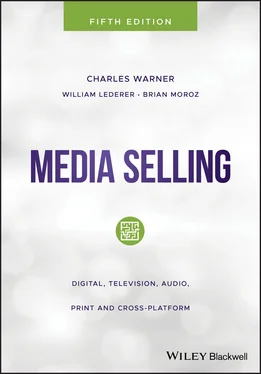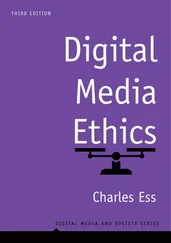However, clever short‐term tactics are unwise for corporations for three reasons: (1) corporations, by charter, are immortal – they last forever – and, therefore, they want to do business a hundred years from today, (2) corporations have multiple relationships with customers and suppliers thus making it highly unlikely that they can keep details of these relationships secret for very long, and (3) in the age of transparency 4 created by the Internet, “…Information is like a toddler: It goes everywhere, gets into everything, and you can’t always control it.” 5 These reasons are especially important for large public corporations that file detailed reports with the Securities and Exchange Commission. Some of these reports contain information on contracts with key strategic partners and are available to the public from https://www.sec.gov/edgar/searchedgar/webusers.htm– an example of transparency.
These three factors are magnified several times with media companies because their revenue depends on maintaining the long‐term trust of their advertisers, subscribers, and audiences. Major advertisers provide the lion’s share of revenue for most media businesses. Furthermore, major advertisers such as Proctor & Gamble (P&G), General Motors (GM), and AT&T not only have long memories, but they will also be around in a hundred years. As Warren Buffett, known as the country’s most astute investor, has said, “Trust is like the air we breathe. When it’s present, nobody really notices. But when it’s absent, everybody notices.” 6 It is not smart business to undo a trusting relationship and bite the hand that will feed your company in future years. If media salespeople lie, cheat, gouge, or overpromise and underdeliver in order to make their short‐term numbers, they jeopardize revenue far into the future. Simply put, advertisers do not buy from someone they do not trust – they are not looking for one‐night stands; they prefer long‐term partnerships.
There is also a good chance that if you deceive any of these large customers, they will tell others, especially your competitors and the press. The press loves stories about corporate bullies, liars, and cheaters, and as Dov Seidman writes in his book How , “Corporate scandals, celebrity breakups, political corruption: Each day’s news – delivered instantly via television, radio, website, cell phone … exposes the transgressions of the icons of the day…once we’ve gotten a taste of scandal we can’t seem to get enough.” 7 The public has become scandal addicted.
It seems that many corporations, politicians, and people today either do not know about or care about rules, norms, standards, or ethics. Perhaps they go along with unethical behavior because of group pressure or peer pressure or perhaps they rationalize to themselves “everyone does it,” “it’s standard practice in this business (or political campaign),” or “no one will know; I won’t get caught.” Maybe they think, “My manager said to do what it takes to make the quarter,” or “If I don’t take their money, someone else will.” Such callous rationalization of lying, cheating, and stealing is typical sociopathic or malignant narcissistic behavior.
Within the last several years, I know of a salesperson for a major media company who forged a client’s signature on a contract. The salesperson was certain the customer would eventually sign the contract, and the salesperson wanted to start the campaign early in order to meet his quarterly quota and, thus, make more money. When the advertiser got the first invoice, the surprised reply was, “What’s this, we never bought anything or signed anything?” Why did the salesperson forge a signature? Was there pressure from management to close business early or did greediness motivate the salesperson? What was the root cause of this unethical behavior? Of course, being a sociopath or a narcissist clearly can lead to unethical behavior, but people not suffering from these personality disorders sometimes behave unethically. Why?
Reasons people do not follow the rules
There are many reasons for unethical behavior, but among the most common are these. (1) People have a strong tendency to bow to authority and follow orders from higher‐ups, giving them the excuse that “I was just following orders.” (2) People have a strong tendency to bow to the social pressure and conformity of their peer group, perhaps a left‐over tendency from their teenage years, leading to the excuse of “everyone does it.” (3) Unethical behavior is often due to an absence of clearly defined and communicated rules of behavior, standards, norms, or codes of ethics in a peer group, organization, company, or an industry, particularly for salespeople, allowing people to say “nobody told me.” (4) They are unaware that, “Every keystroke on your computer is there, forever and ever” 8 in the age of transparency and the likelihood of getting caught is exceedingly high. (5) Corporate cultures that encourage employees to wink at their company’s code of standards or mission statement can justify their actions by saying, “no one will know; I won’t get caught.” (6) They believe their celebrity, fame, and power is so great that on impulse they can do anything they want.
While people who bow to authority may have to give up their individual free will and autonomy for the sake of the organization they work for, they do not have to turn their conscience and their self‐esteem over to that company or to anyone else. “Just following orders,” as we learned in the Nuremberg trials, is not a valid, acceptable excuse for doing the wrong thing. On the other hand, people who cave in to peer pressure in order to conform negate their own free will and autonomy and hand over their conscience and individuality to the crowd. “Everybody does it” is not an acceptable excuse for breaking the rules or for unethical behavior. An absence of clearly defined standards and codes of ethics can lead to unethical behavior because people can use the cop‐out “nobody told me.” This excuse is hollow because ethical behavior is implied and assumed in all of our daily social interactions. For example, we do not go around killing people because nobody said “Don’t kill anyone today.” Most people know what we are supposed to do and not to do, and know what the norms of decent behavior are.
Groups, organizations, and companies must create and communicate ethical standards to guard against these abuses and, even more importantly, to follow up with practices and behavior at the highest levels of the organization that adhere to stated corporate standards. Unfortunately “Do as I say, not as I do,” can be as effective on employees as it was on me as a teenager when my father told me not to smoke cigarettes as he puffed away on one of his 40 Camels a day. For example, Enron had a clearly defined code of conduct that it communicated to everyone in the company and posted on its website. Enron’s top executives obviously viewed this code as public relations, not as a set of rules they should follow, thinking arrogantly and cynically, “No one will know.”
Employees of an unethical company whose executives do not follow the rules should strongly consider leaving the company and looking for another job. Leaving an unethical, corrupt company is probably in your long‐term self‐interest because when the company’s ethical problems come to light, your pension fund or 401(k) plan will be worthless if it is invested in the stock of a company that declares bankruptcy. Also, your reputation will be tainted in the job market. Therefore, select the companies you work for very carefully and choose ones that will enhance your reputation not detract from it.
Ethics are clearly defined and published standards and norms of right and wrong that are expressed as guidelines for behavior. There are three general types of ethical standards. First, most organizations, companies, and professions have written codes of ethics or standards of conduct. Next are accepted beliefs and modes of conduct among various social and ethnic groups. Finally, individuals have their own standards of right and wrong that they use to make daily judgments, which are based on a combination of deep‐seated personal values and beliefs inculcated from the first moment parents say “bad boy” or “bad girl.”
Читать дальше












